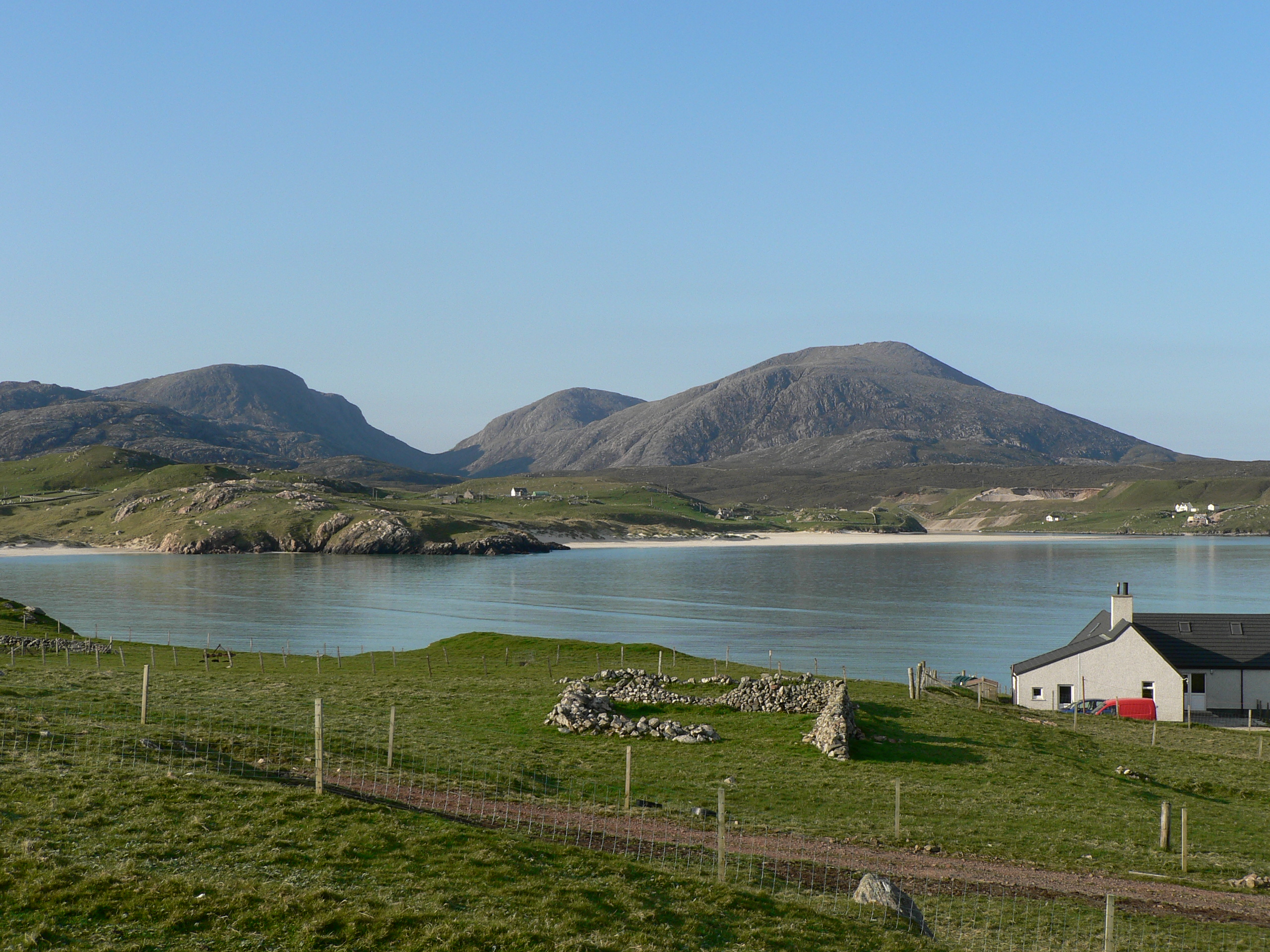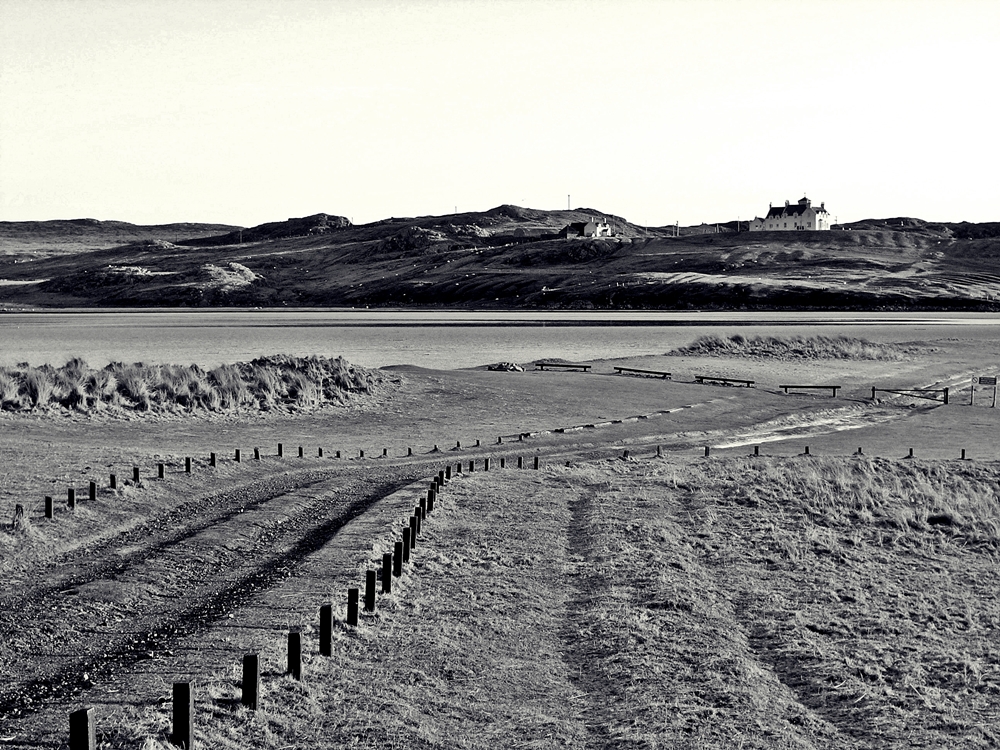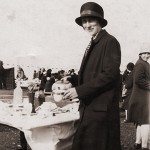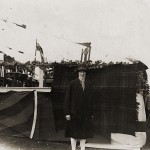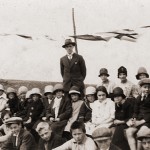Author: admin (page 25)
The Marquis of Stafford Sails
A further entry from the 1851 Diary of John Munro Mackenzie, enumerating his difficulties in getting the emigrants away. They sailed first for Troon, and thence for Quebec. It seems the Marquis of Stafford that took them to Canada was a steamer, unless the reference here refers to another boat that transfered them to Troon first (although when she first arrived in Loch Roag, Mackenzie records being on board the Marquis.)
Tuesday 20 May
Arrived at the Port of Ness at 3am having had rather a disagreeable passage from Loch Roag, there being a heavy swell, which brought on Sea Sickness among the women & children and the appearance in the morning of the decks and fore hold were anything but agreeable.
Landed at Port immediately on arrival and walked about for some tiem before any of the Emigrants appeared — Had considerable difficulty in getting the fishermen to get their boats to put the Emigrants on board the Steamer, but after losing much time & using entreaty & force by turns got the Emigrants will their luggage all in boats, but observed the first boat sent to the Steamer returning with her cargo without getting it on board — On proceeding on board the Steamer found that the Uig people had rebelled against allowing any of the Ness people on board saying that there were quite enough on board — that there being fever and smallpox at Ness they would not allow a man on board at this place — I remonstrated with them but to no effect, and the Ness men having taken fright returned to the Shore.
Bronze-Age Cairn at Tolanais
The Marquis of Stafford in Loch Roag
Valtos School 1952
Owning Uig Lodge
From Emily Macdonald’s Twenty Years of Hebridean Memories (1939). In 1923 Emily, niece of Lord Leverhulme, was married to Donald Macdonald, Dolly Doctor, who had Uig connections and later wrote Tales and Traditions of the Lews. They were given Uig Lodge as a wedding present.
Stornoway was reached some six hours after leaving Kyle, and we went that summer evening to my mother-in-law’s house in New Street, where we had arranged to stay for part of our holiday. It was while we were at New Street that I spoke a few joking words which afterwards led to our possessing Uig Lodge and Gisla. My uncle came to have tea with us one afternoon, and during the course of his visit, told us of his failure to come to an agreement with the Government over his schemes for the welfare and development of Lewis. Something was said about giving up the Island, and I said, “If ever you think of selling Uig Lodge, give me first refusal.” I knew, of course, that we couldn’t even think of buying a property a quarter of the value, but it was just one of those things one says on the spur of the moment.
A few weeks after our return to London, my uncle asked us if we would like to possess Uig, and we went over to Hampstead to discuss the matter with him. Of course, I need hardly say we were delighted to accept such a wonderful gift, but there were various details to be considered. My uncle wished to give us the Lodge with its attendant fishing and shooting rights, but did not wish to burden us with the worries and responsibilities of the hundreds of crofts in the district. On taking legal advice, however, it was found that though one could possess fishing rights without land, one could only be the owner of shooting rights if one owned the ground also. My uncle saw the pitfalls in this arrangement at once. Among other difficulties, should any of the crofters default on their rent, we should find ourselves out of pocket, as it is certain that we could not do likewise when it came to our paying the rates. Over a large area like Uig (it is a hundred square miles) this might become a most serious situation. Anyway, the end of it was that my uncle suggested we should try to run the estate intact, and if it proved too much of a burden, he would take the land with its shooting rights and crofts back again. To safeguard our private property, he made his gift in the form of a limited company, so that should the estate go bankrupt, at least we should not lose more than itself.
Women of Uig Victorious
Rental Paid in 1725
The Archaeology of Skye and the Western Isles
Coming from the Valtos Shieling
Finds in 1915
A letter to the Gazette on 15 October 1917, by “DJM”, Donald J Macleod, Inspector of Schools (not DJ Maciver as previously indicated.)
‘Neiseach’ [from a previous correspondence] maintains there are no pre-Norse Celtic remains in our island. That is not so, I may be able, in a limited way to illustrate at first hand. In 1915, I was fortunate enough, with the aid of a friend, to recover certain articles of antiquarian interest from a Viking grave at Valtos, Uig. These included two large oval Scandinavian brooches of brass, a connecting chain of the same metal, an amber bead, a fairly large heavy circular bronze ornament with raised centre and surface decorated with incised looped cords characteristically Celtic, a Celtic penannular brooch of bronze, a buckle and belt mounting also of bronze, with what Mr Curle, of the Scottish Museum, to which they were sent for expert examination, termed “double interlaced knotwork typical of the Celtic manuscripts of the best period. Also an iron knife and socket spear-head much corroded. A full description, with figured plates, will be found in the last volume of the Transactions of the Scottish Antiquities Society. It will be noted that all (and only) the bronze articles are indubitably Celtic. Mr Curle places the state of the burial about 850, and the fashioning of the ornaments at a very much earlier date. Of course, if may be suggested that they were the spoils of a Viking raid in Ireland, but the much more probably explanation is that these ornaments were secured from some Lewis source, probably a native family of distinction. In any case they are remains of an early age, found in Lewis, and as Celtic as any ever discovered from Cape Clear to the Butt.
The Sergeant Mòr of Pabbay
We ♥ Strome
Emily Goes to Church, 1919
Four Uigeachs in Sydney
Summer of 1938
Twenty Years of Hebridean Memories
TB Macaulay’s Speech
On TB Day, 18 June 1929, TB Macaulay of the Sun Life Assurance Company, Montreal, visited Valtos and was presented with an illuminated address by Rev Malcolm Maclennan, on behalf of the people of Uig. Rev Maclennan gave a speech, and TB followed, as reported by the Gazette:
Mr Macaulay, acknowledging the presentations, said it was not an easy thing to reply to such an address as he had been listening to, and to express his thanks for such as welcome as they had been kind enough to give him. He would have been glad naturally to come to Valtos, but as he had realised the warmth and enthusiasm of their welcome he felt humbled and overwhelmed, because after all he could not help asking himself why he should be so signally honoured. there was only one reason that would not apply to scores of other right there in that crowd, and that was that he had been blessed by providence with the means that enabled him to do some things that many others present would have been willing and glad to do if they had the opportunity. After explaining the ways in which he had first become interested in Lewis, Mr Macaulay said that, beginning with his reply to the appeal in connection with reconstruction of the Stornoway Municipal Buildings, he got into it, and the more he got into it, the more he felt the call of the blood. (Applause.) And he felt that, as he had been blessed financially, he wanted to give away something, and he decided that he should give it, first, where he would be interested, and second, where it would do good. (Applause.)
That was the beginning of his interest in Lewis, and since then he had got in deeper and deeper, and gradually got visions of what might be done to improve conditions in the Island. He did not need to tell them what he had endeavoured to do, for they had recounted very kindly in the Address some of the things he had done. Scotsmen and Highlanders, and Islanders even more so, he continued, had a feeling of affection for their old home, and somehow he felt, standing in the home of the Macaulays, as if he had been there before. (Applause.) The place seemed to him to be inhabited by the spirits of his ancestors. (Applause.) These forebears of theirs had looked around on these same hills that he was looking at now, n the same scene of beauty that was all around them there. He was really more happy than they could possibly imagine to feel that he had a claim in that place, and that he was not just like some visitor, some Englishman, looking round and saying, “This is a beautiful spot.” So it is a beautiful spot, said Mr Macaulay, but it is more, it is your spot, and it is my spot. (Loud applause.)

